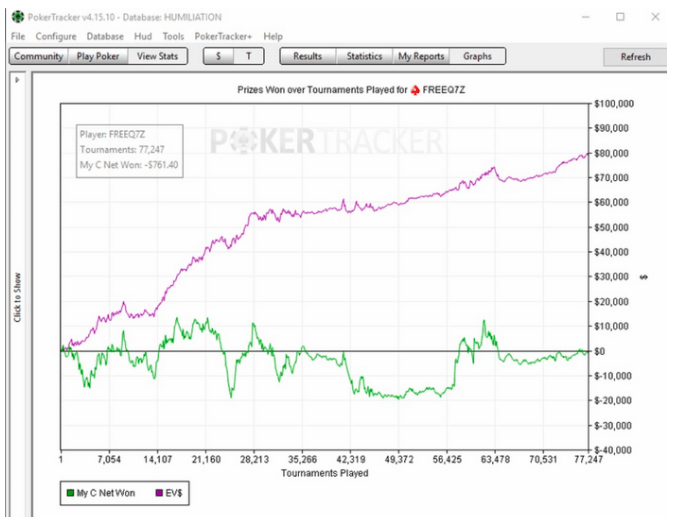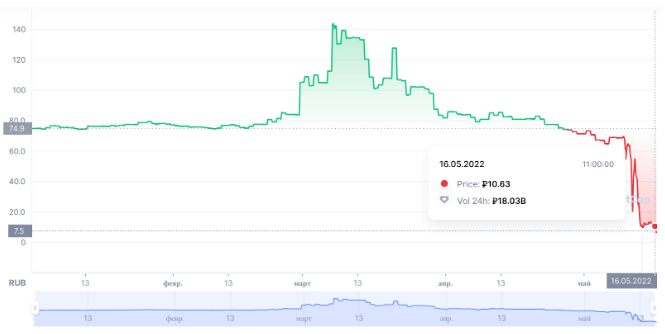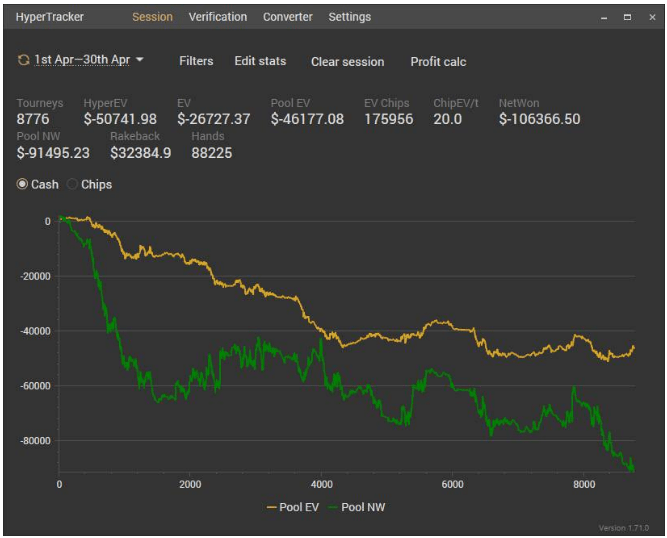Spin&Go – is there a bright future after February 24?
Gipsyteam forum material about how things are currently going in the discipline that suffered the most when the rooms left Russia and Belarus. Players and pool executives tell how they have adapted to the new reality, whether it is necessary to change the place of living, how much the win rates, the game volume and nerves have been affected.
Bezsmisla111 // twitch.tv/LesShiyps
I'll start with the fact that Spin&Go has a very high variance. Perhaps it is even more than in MTT. But this variance is greatly reduced by pools. Therefore, all rooms can be divided into two types: those where pools work, and all the others.
After the rooms left Russia, only one room remained in the first category – PokerOK. It is not difficult to guess what is happening there from the moment when he became "the only one". For most Spin&Go regulars, these changes mean that they either go to earn money on PokerOK, or move, or let's put it this way, become factory workers. Playing without a pool is not an option for many. Why is that?
Firstly, to play without a pool, you need a bankroll threefold larger. A hypothetical $25-50 player with the same bankroll will be forced to go down by 10$ (in a room without pools), which will lead to a significant decrease in his $ per hour.
Secondly, when playing without a pool, the variance is huge. In addition to a bankroll, it is advisable to have a solid financial cushion (at least for a year) and very strong nerves. For example, in the last 7 000 tournaments, I have already lost 12,000$ (180 BI!). But for someone, this is a distance that is played out in two months. And there may be several such periods in a row. Also, a person may not be able to handle some kind of stake by playing zero on EV, and in fact playing negative.
In the context of such conversations, the legendary FREEQ graph is often shown:

For many players, a distance of 77 000 regular spins is 1-2 years of gaming.
Let's say a player realized that PokerOK doesn't work for him and decided to put up with variance and play without a pool. What awaits him in the remaining rooms available to Russians?
1. Very low traffic. In some rooms, you can't even sit on two tables at adjacent stakes at the same time. In others, you can collect four per stake. In the daytime, even on a popular net, you can wait 5-10 minutes for the game. While in the pool rooms, it was possible to easily get 6-8-10 tables.
2. Special specifics of the field. In some rooms, high stakes were occupied by cartels who divide time, and sometimes even sit down in twos and "squeeze out" all the newly arrived regs. In other rooms, some obvious bots are playing, whose nicknames are easily googled, since a few years ago topics were created about them on GT and 2+2.
3. Constant paranoia. It seems that you are constantly being "shoved" to, people use prompters when playing against you, etc. It is based precisely on rumors about small rooms and on a large, unpredictable variance, which the brain tries to explain with some conspiracy theory.
4. A very delicate balance of the participants. The arrival of 1-2 additional regs at the tables at your time makes the game unfavorable.
As a result, a modern spin player from Russia has to choose between a crazy and not necessarily positive game with regs on PokerOk, and the problems of non-pool rooms voiced above. I would call it "choice without choice".
I won't tell you much about the rooms available from other countries, since I play from Russia myself. But, according to rumors, the fields in the departed rooms are now very good. I can't name the most profitable one. In my opinion, in modern spins it is necessary to look not for profitable rooms, but for profitable stakes. But in the rooms "outside of Russia" incomes are definitely higher now.
Globally, Spin&Go will not die for a very long time. Too interesting a discipline for amateurs. But for the players from the Russian Federation, it is now on its final breath. When I myself found out that Pokerstars would no longer be there (after the leaving of Partypoker and the unavailability of Winamax) — I was in shock for several days and did not know how to live on. But those who love poker, and spins in particular, will definitely come through.
Storo08
After leaving Pokerstars, I only play on RedStar. The field has become noticeably worse, at the 20$ stake it has not changed critically, at 50-100$ it was already not particularly good. But most of the regs came to the 10$ stake, and things got worse there — but, in general, most of the players are making money.
In the remaining few rooms, I think things are not very good either. So the prospects for spins are not very good. You can still play professionally, but for this you need to do long distances, work on the game and choose the right time to play.
Sweetcoqueta // startyem v2.0
– How has the field changed in Spin&Go?
–If you look at the average results on the field, then in March at PokerStars the field was quite mild. On Partypoker, too, all players' results improved. Since PartyPoker left Russia back in February, before the events began, the number of weak players has not changed, and the number of regs has decreased. For the first two months, a lot of regs from Russia either played little, or began to migrate to other rooms in finding themselves, so to speak. It seems that now the situation has begun to normalize, as players began to return to Pokerstars. There is nothing particularly good in the rooms that have remained in Russia.
– In which rooms are the conditions for playing spins the most favorable now?
– Three Spin&Go whales: PokerStars, Winamax, PartyPoker. There is also PokerOK, but it is less profitable – the average win rates there are even worse than on PokerStars, and the rakeback is the same.
– How have your win rates and the amount of games changed after February 24?
– I did not return to the game right away. At first, I was looking for something new, changing disciplines, thinking more not about earning money, but about how to spend time, so as not just to procrastinate.I played a few, at first 3-4 hours in the morning. I played cash, MTT, SNG, the same spins in the rooms available for Russia – PokerOK, VPN network, Chico. I even managed to make relatively good money. But I missed spins and full-time work, so I moved for the opportunity to play in rooms suitable for this discipline. I am happy to be back on PS.
– Is it realistic to live in Russia now and play spins professionally?
– Speaking globally, you can play professionally, of course. And earn some money. After all, there is PokerOK, where you can play and earn. But it's a little less profitable. Overall, the situation has definitely worsened. Previously, there was a choice where to play. Now there is no choice as such. I agree that spins probably suffered more than other disciplines.
AwesomeRupert // Steel Phoenix pool
There is currently only one room available in pools for players located in Russia – PokerOK. Without a pool, playing spins on a regular basis is a rather sad, adventurous occupation, especially if it is your professional activity, while you do not have a bankroll for a year of life and nerves of steel. There must be some additional motivation: an unrealistically tempting field, some side financial interests... or the belief that the variance will be on your side, and you will not fail.
The volume of play in the pool has decreased for obvious reasons. But considering that those players who wanted to move have already settled in a new place, we are optimistic about the future. Pokerstars has unfrozen the bankrolls of most players. Those who wanted to — withdrew the money and went to PokerOK. Who wanted to – relocated. People gradually come to their senses, move away from the first shock and return to the game. I think that few people will decide to quit Spin&Go because of the events going on. And if people play Spin&Go, they do it in a pool.
If we compare the win rates in the rooms that left Russia with those that remained, then we can say that nothing much has changed. At PokerStars, win rates in regular spins increased by 4 chips at low-medium stakes and fell by 4 chips at 100+$ stakes. Perhaps our sampling is still insufficient, but this is about 0.8% EV ROI. In flushes, win rates increased at all stakes within 0.5-1 chips (0.15-0.3% EV ROI).
At PokerOK, at the lowest stakes, win rates fell by 2-3 chips (0.5-1% EV ROI). There are no pronounced trends at the 10+$ stakes. Fluctuations within 1 chip (0.3% EV ROI) month to month in both directions.
In general, everything is the same as it was. It's just that a lot of regs who used to have a flag of Russia are now playing with a different flag :)
Shvedkin // HyperSchool pool
I identify two areas in which adaptation took place in our pool: technical and psychological.
The technical part is everything that concerns the restructuring of processes in the pool. For example, when restrictions were imposed on the use of Skrill, we had to look for backup options, improve internal systems for a different transaction configuration (we had to take into account the countries and the real location of the players).
Unfortunately, the main blow fell on areas that we do not have automated, namely, exchanges between rooms, payment systems and cryptocurrency. They are important, because we have hundreds of players, and everyone uses different payment cards. There may be an imbalance when they send a lot through some kind of payment, but it is necessary to use another one. All this is cross-platform, as we support transfers in rooms, payment systems, and crypto altogether.
Against the background of constant freezes on the part of payment systems and the need to win back money in the rooms, the cryptocurrency seemed like paradise. The fact that this is far from paradise, and stablecoins are not always stable, the market showed the other day. The very concept of stablecoins was shaken – everyone saw that they were not so stable, many recorded losses. When the restrictions began, we began to actively talk about the possibilities of cryptocurrencies in the context of pool transfers. First we started supporting USDT, then UST, and we planned to expand this list. The percentage of pool transfers in cryptocurrency increased from 5% to 12% in two months. And then such a turn from the market – the epic fall of Luna and UST, the shaky USDT, the general downfall of bitcoin, ethereum and altcoins, crash-boom-bang!

UST stablecoin Adventures over the past month (TerraUSD)
Why am I talking about this in the pool context? It's simple: cryptocurrency is also a tool for storing players' deposits (this is insurance for connecting high multipliers in the pool, and players without reputation leave deposits).Imagine a situation where we would keep all deposits in UST, putting them in an Anchor, which for so long gave a guaranteed 19%. We even had claims that we can receive such a large percentage of the deposit storage and do not pay an exchange fee if the player does not use cryptocurrencies, but only Skrill, for example. But cryptocurrency means dozens of protocols, commission costs and full-time occupation. If you do not engage in asset management, you can stay without them.
If we had kept everything in UST, we would be in a very difficult situation right now. But as it is, we still got off lightly, but the market is so volatile that it is impossible to assert anything. Everything is relevant exactly at the moment when I write about it.
Now about psychological adaptation. Many were at a loss, the flow of requests for support increased many times, moreover, from players from all over the world (according to the frequency of requests after Russia, Ukraine and Belarus, players from Poland wrote most often). There were regular questions in discord, will there be the split, is everything OK?
Then we realized that we needed to communicate more with people. In March, we wrote regular news reports on the worldwide and the pool, posted relocation guides, crypt guides. It was important to stay in touch. The uncertainty, the ever-increasing pressure, and soon scenarios that at first seemed unlikely began to come to life. I won't say that we were ready for this, but we gradually adapted to everything.The amount of work increased, but we can say with confidence that we survived that crisis. Also, many players recovered from the initial shock, planned a move or a change of room, and someone and a change of activity. In April, everything was already going more or less as usual, and a new shock awaited everyone in May.
I'm talking about changing the multiplier structure on Winamax. Why did it affect everyone? The pools now have a split formula proportional to the buy-ins played (in the case of our pool, the buy-ins played + player's EV). This formula appeared at the time and solved the problem of profit sharing at negative EV — and allowed to balance the swing share between players of low and high stakes. The formula is not perfect, but it did its job successfully, until Winamax changed the structure. When this happened, it became obvious that if nothing is done about it, the Winamax players will greatly shake the variance, and the players of other rooms will pay for the banquet. Everything is going to the fact that the split formula in the pool may soon change. The game will become more variance-based for Winamax, but the distribution will be more honest. There will be no details for now, work on the formula is not finished yet.
After the February events, there were about 100 fewer people in our pool, and the total buy-in decreased by 15 million dollars (it used to be 70 million – it turned out to be 55 million). Some players return to the pool after relocation, there are also those who wait or play in rooms without a pool. There is growth due to new players from other countries.
As for the rooms, according to the basic conditions, all have about the same thing – everyone plays for rakeback, challenges, leaderboards and a variety of promos. But individual conditions may be different. For example, one PokerStars player will be given a challenge, and another will not, and this will make the game in this room unprofitable for him personally – he will not sit out those who fulfill the challenge. And the benefit also depends on the ability to plan the game time: there are leaderboards that take place at a certain time or at some time the game is better (more fishes, no inconvenient opponent, etc.).
The number of rooms with Spin&Go, for players from Russia is now very limited. First PartyPoker left, then PokerStars. Winamax has not worked for Russia for many years. Only PokerOK remains – it is supported by the pool. If a player is ready to play without a pool, he has more options. But to play without a pool, you need a bankroll of at least 300-400 BI, or even more, just look at the streaks of pool players in BI – it reaches 600 BI, and this is only for one month.





